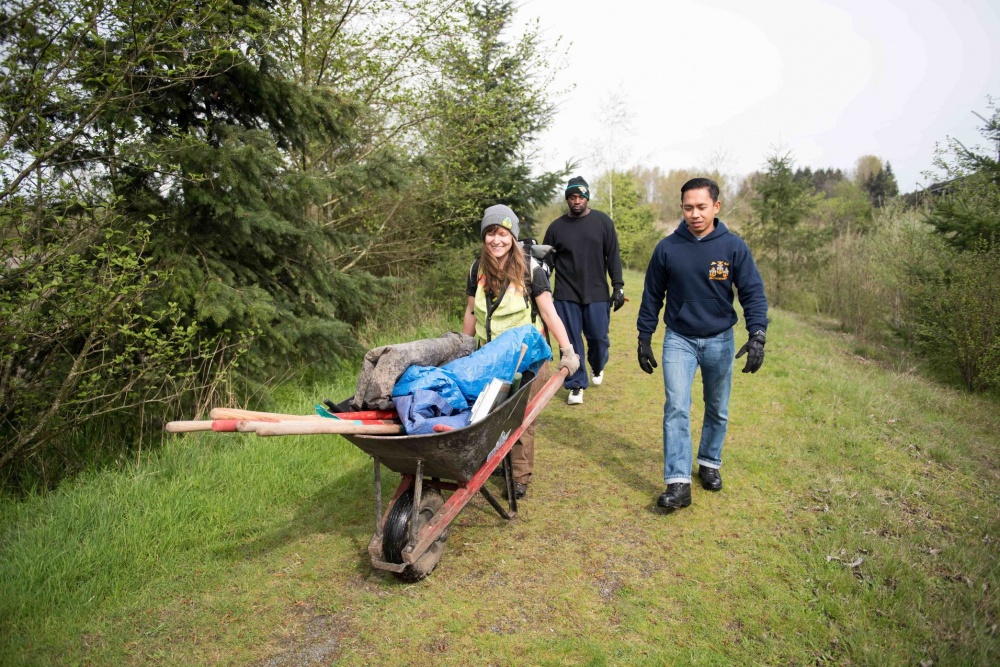
By Alex Craven, Our Wild America Senior Campaign Representative
Mariska Kecskes started with Sierra Club in February and is a few months into her not-so-new role as an organizer with the WA Chapter. She will be focusing on some of Sierra Club’s longest-running efforts, preserving forests and rivers. I caught up with Mariska to talk about her work, what motivates her, and the things she’s looking forward to about being part of the Sierra Club community.
Let’s start with an easy one. Could you tell us a bit about yourself?
I’m originally from central Montana, and was fortunate to grow up surrounded by nature and majestic landscapes. I moved out to Seattle in 2008 for college and have been calling it home ever since!
What motivated you to work in the conservation field?
I was very interested in the environment and science throughout my childhood, but really it was taking classes in environmental philosophy and environmental justice near the end of my Senior year of undergrad that I realized I wanted to work in the environmental field as a career. I knew I wanted to work in public service prior to that, but I realized just how much the environment intersects with so many other social equity issues and at the end of the day, a healthy environment is foundational to healthy communities.
This epiphany was all fine and good, but I was just about to graduate with a degree in Philosophy and hadn’t taken a science class since highschool. So I joined the Washington Conservation Corps, where I spent a year working outside everyday doing habitat restoration in greenspaces and public lands across the region, and from that point on I was hooked!
That sounds fascinating! What was your trajectory from there?
Well, I did two years with the Washington Conservation Corps, first working on a restoration crew with the non-profit Forterra, and then planning and implementing restoration projects with volunteers and doing knotweed monitoring along the Cedar River.
After that I went to grad school in Budapest, Hungary to get a MSc in environmental science and policy. I was pretty into urban forestry at the time, so I wrote my thesis on using GIS to analyze Seattle’s urban forest through an equity lens.
I did a summer stint as an environmental educator for a summer camp at Discovery Park, and most recently was a senior project and program manager with the Seattle non-profit EarthCorps, where I both worked with volunteers in cities across the Puget Sound region to implement restoration projects, as well as lead an environmental leadership program for young adults.

In that time, was there one environmental issue that you found you care most about?
It is really hard to not always come back to salmon recovery on this one. But that’s because for me, restoring and protecting our salmon is about so much more than just salmon. Salmon are crucial to so many livelihoods, communities, ecosystems, and in reality our fates are very intertwined; When we take care of our Salmon, we take care of ourselves. Because while salmon conservation may look like removing dams and preserving wilderness, it also looks like restoring greenspaces in our cities, fighting for clean air and clean water for communities in the Duwamish Valley, advocating for a green new deal to address climate change, or actively supporting tribal sovereignty and treaty rights. Salmon are an indicator for the health of an ecosystem, and that includes us too. That means we need to improve the entire ecosystem to truly bring our salmon back.
Can you talk about the issues you’ll be focusing on in your new role?
I will be working on our public lands issues here in Washington state. My big focus at the moment is building a base of supporters around our public lands, and specifically trying to bring new folks into this work. My hope is that as opportunities for advocacy arise -- like providing comments on potential revisions to the Northwest Forest Plan, expanding Wilderness in the Olympics or calling for protecting 30% of our lands by 2030 in order to offset the worst effects of climate change -- folks have the tools to make their voices heard on these issues.
One piece that I am really excited about is supporting our Public Lands Group, which is a volunteer-led group within the Washington Chapter. The group’s mission is to bring new and diverse folks into public lands advocacy by fostering an inclusive and fun community and supporting each other in taking actions to protect our public lands. They put on regular events open to the public, and it's exciting to see the group develop and grow.
Speaking of recruiting new volunteers, are there particular things you’re looking for help with?
Two opportunities we have at the moment are to join our National Forest Committee and Public Lands Group (the one I mentioned earlier).
For folks who are interested in learning about forest management and biology, and want to work with other volunteers to analyze and comment on land management projects, the National Forest Committee is always excited to bring new members on to their team.
And for folks who are maybe newer to public lands work or are interested in planning social events or organizing mobilizing actions like phonebanks and letter writing - the Public Lands Group is a great place to get plugged in! Folks can email me about either of these groups to learn more and get connected.